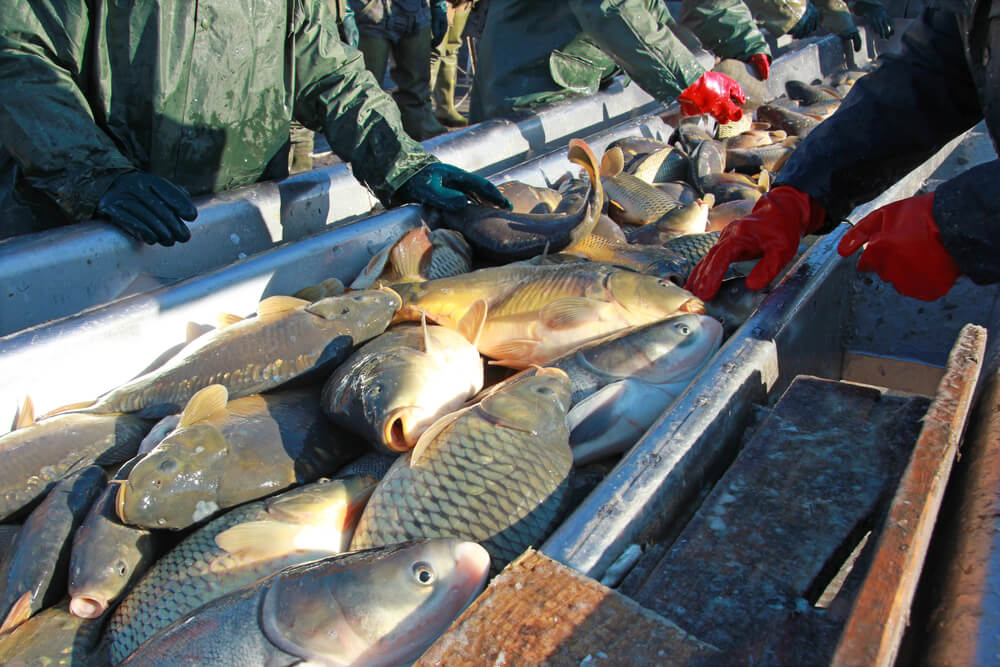By failing to regulate business activity, Canada is complicit in forced labour and other abuses in the global fishing industry
Unacceptable working conditions are ubiquitous in many global fisheries. These include extreme physical demands over long hours without adequate food and water, coercion through misleading or false work agreements, little pay if any, an inability to leave at will, and even physical, psychological and sexual violence.
In some cases, working conditions amount to forced labour.
Without effective regulation, it’s inevitable that seafood produced under these conditions ends up on Canadian dinner plates. Yet Canada is doing little to ensure that the seafood we import is produced without human rights abuses.
In 2022, the Standing Committee on Fisheries and Oceans produced a report recommending that the federal government implement a ‘boat-to-plate’ traceability program, arguing that it would help identify where problems exist along the supply chain. However, no bill has been introduced to Parliament to legislate such an initiative, leaving consumers in the dark.
Unlike Canada, some countries are taking action to tackle human rights abuses in seafood supply chains.
In July 2022, the U.S. signed a memorandum with the intent of blocking seafood imports produced through labour abuse. If importers wish to continue supplying U.S. markets, they’ll have to end sourcing seafood produced through illegal and harmful activity – including forced labour and other unacceptable practices. This significant policy change demonstrates a rare effort to block imports of Illegal, Unreported and Unregulated (IUU) fishing with explicit attention to labour abuses.
The Canadian government has taken no similar action. Instead, Canada contributes to these abuses by ignoring what happens before imported seafood enters Canadian markets.
It may come as a surprise to many Canadians that under the new free trade agreement with Mexico and the U.S., it’s already illegal to import goods produced by forced labour into Canada. However, the ‘forced labour import ban’ is not being adequately enforced in Canada. Since it came into effect in 2020, only one shipment of goods has ever been seized under the ban. It was later released after the company challenged the decision.
A key step in addressing human rights abuses in Canada’s seafood supply chains would be an effective enforcement of the ‘forced labour import ban.’
Canada must also take additional steps towards addressing forced labour and other abuses in fishing by imposing human rights and environmental due diligence obligations on companies, as Bill C-262, the proposed act regarding thecorporate responsibility to prevent, address and remedy adverse impacts on human rights and the environment in their supply chains, would do. For Canadian importers – including seafood importers – this would entail taking rigorous action to rid their supply chains of abuses, like forced labour, or risk being held liable in a Canadian court.
By contrast, Bill S-211 which addresses forced labour and child labour in supply chains, simply requires companies to report on forced labour and child labour risks without mandating any changes in a business’ operations. Parliament willlikely adopt this bill in early 2023.
Human rights and environmental due diligence legislation would recognize the broad range of labour rights that fishers are entitled to, going beyond only addressing the most extreme abuses.
A proactive approach to ensuring ethical supply chains would mean decent work for fishery workers rather than only an absence of the worst abuses. Further, it would give a voice to affected workers, facilitating their access to Canadian courts to defend their rights.
Canada must also answer the demands of fishery workers globally to cease its complicity in harmful labour practices and other abuses in the industry. Demonstrating a serious commitment to this goal requires more than making progressive statements, adopting toothless legislation and signing on to non-binding international agreements, all of which have proven ineffective.
It’s time to enforce the forced labour import ban and implement mandatory human rights and environmental due diligence legislation. These measures would support fishery workers – and all workers — involved in Canadian supply chains.
Photo courtesy of DepositPhotos




